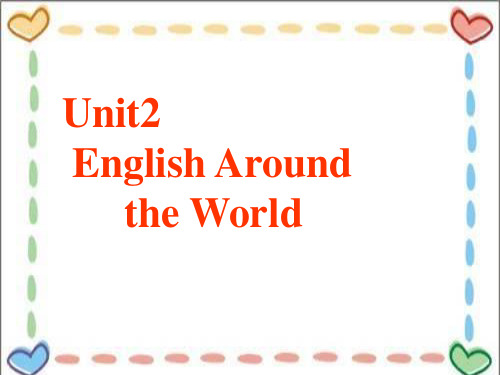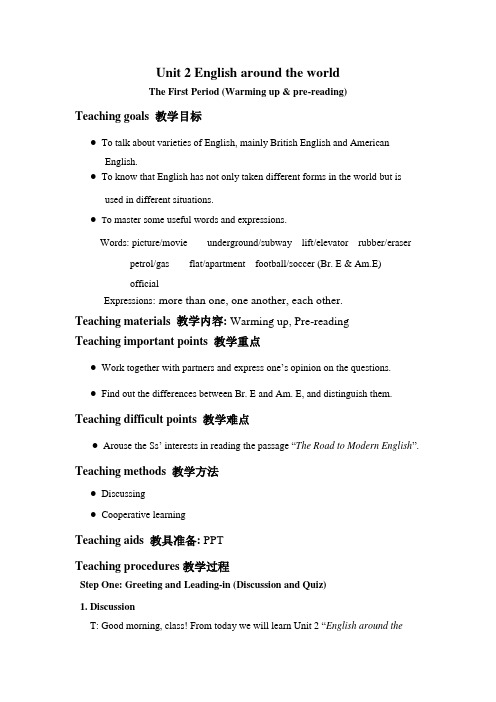人教版高中英语必修一Unit2 English around the world (2)
- 格式:docx
- 大小:25.07 KB
- 文档页数:5




Unit 2 English around the worldThe First Period (Warming up & pre-reading)Teaching goals 教学目标●To talk about varieties of English, mainly British English and AmericanEnglish.●To know that English has not only taken different forms in the world but isused in different situations.●T o master some useful words and expressions.Words: picture/movie underground/subway lift/elevator rubber/eraser petrol/gas flat/apartment football/soccer (Br. E & Am.E)officialExpressions: more than one, one another, each other.Teaching materials 教学内容: Warming up, Pre-readingTeaching important points 教学重点●Work together with partners and express one’s opinion on the questions.●Find out the differences between Br. E and Am. E, and distinguish them. Teaching difficult points教学难点●Arouse the Ss’ interests in reading the passage “The Road to Modern English”. Teaching methods 教学方法●Discussing●Cooperative learningTeaching aids 教具准备: PPTTeaching procedures教学过程Step One: Greeting and Leading-in (Discussion and Quiz)1. DiscussionT: Good morning, class! From today we will learn Unit 2 “English around theworld”. Please turn to page 9. This class we will talk about “Warming up”and “Pre-reading”. At first, let’s discuss something.Teacher shows the “discussion”on the screen. Ask Ss to1) look at the following pictures and think in what situations English is used.(T: Please look at the following pictures and think in what situations English is used. Please discuss in groups of four or six, and finish it in 4 minutes.)Teacher shows the pictures on the screen..4 minutes later. Share the discussion results. (T: Time is up, invite some of you to share the results.)2) look at the following world map and find out the countries where people speak English as their native language. (T: Please look at the following map and find out The countries where people speak English as their native language. Let’s do it together.)Teacher shows the world map on the screen.2. QuizT: Now let’s do a small quiz to judge which country’s national flags these are, and think what language is spoken in these countries. Please discuss it with yourpartners, and finish it in 2 minutes.Teacher shows the national flags of some countries in the world map. 2 minutes later, check the results one by one.T: Class, what are the languages spoken in these countries?”Ss: English. T: Yes, English is spoken in these countries.Step Two Warming up (SB. P9)1. Guide Ss to summarize some kinds of English: British English, American English,Australian English, Canadian English and India English.T: Do you know that there is more than one kind of English in the world?Ss: Yes, there are many kinds of English.T: According to the above discussion, what kinds of English are there?Ss: British English, American English, Australian English, Canadian English and Indian English.2.Guide Ss to find out the two major groups of English: Br.E and Am. E.T: What are the main groups of English? Ss: Br.E and Am. E.T: There are two pictures. The first one is .... Ss: BBC T: The second one is VOA.3.Look at two examples and guess what kind of English they speak, Br.E or Am. E.1) Example 1T: Look at the pictures and guess what kind of English they speak, Br.E or Am. E.S1: A speaks Br.E and B speaks Am.E.T: How do you know? S1: There are national flags in their hats.2)Example 2 (conversation)T: I’d like two of you to read the conversation. Other students guess what kind of English A and B speak. S1: .... S2:.... T: Well done, thank you!T: Last class, we have learned that “apartment” and “elevator” are .... Ss: Am.E T: And “flat” and “lift” are .... Ss: Br. E T: So we can know A speaks Am.E, and B speaks Br. E. Now let’s summarize the Am.E and Br. E in the conversation.4.Supplement-----supplement some Br. E and Am. E.5.Exercises1) Match the words that have the same meaning.2) Fill in the blanksStep Three Pre-reading1)With your partner, list the countries that use English as an official language.T: According to the above discussion, list the countries that use English an official language. S3: America, Britain, Canada S4: Australia, NewZealand, South Africa T: Singapore and India.2)Look at the title and guess what the passage is about.T:“The road” means the development of English. “Modern English” shows there are other kinds of English before modern English. So “The road to modernEnglish” may mean the development of modern English.3)●Read the passage quickly and see if you are right.Choose the main idea of the passage.(B)A. How to learn English well.B. The brief history of Modern English.C. The way to England.D. The difference between Modern English andOld English.● Find out the key sentence of each paragraph. (Pair work, 2m)Paragraph 1: Today, more people speak English than ever before.(4th line)Paragraph 2: Native speakers can understand each other even if they don't speak the same kind of English.(1st line)Paragraph 3: Why has English changed over time?(1st line)Paragraph 4: Finally by the 19th century the language was settled.(1st line) Paragraph 5: English now is also spoken as a foreign or second language in South Asia.(1st line)Homework 课后作业1. Review the words and expressions in the passage.2. Read the passage carefully and find out the difficult sentences.3. Finish the exercises of "Comprehending".Blackboard Design 板书设计Unit Two English Around the WorldThe road to modern English Reflection 课后反思。

Unit 2 English around the world I.单元教学目标II.目标语言III. 教材分析与教材重组1. 教材分析本单元以“世界英语”为中心话题,旨在通过本单元的学习让学生粗略了解世界英语的发展状况,认识各种各样具有民族,地域特色的英语以及它们的出现原因和不同之处。
同时让学生学会语言障碍的表达法,能够区分、转述命令或请求语气的祈使句,并让学生能用所学构思方法写一篇关于英语学习经验的作文。
1.1 Warming Up 介绍世界英语,要求学生区分英美语单词。
此部分的目的是丰富学生有关世界英语的知识。
激发学生对英语发展历史的兴趣。
1.2 Per-reading部分设置了两个与主题相关的问题。
在激活学生已有知识的同时引导学生为下一步阅读做好准备。
1.3 Reading是一篇介绍英语发展史的文章。
文章首先以英语在分布范围上的扩展来陈述英语的发展。
第二段提出英语已发展为多个分支,并举例说明。
第三,四段以时间为顺序,描述英语在不同时期与不同文化的交融,说明世界英语的形成原因,并对中国英语提出设想。
1.4 Comprehending 设计了两个习题。
第一部分以选择题的形式检测学生对课文的理解。
第二部分设置了两个开放性思考问题。
引导学生在掌握课文的基础上联系实际,对英语学习现状陈述自己的观点。
培养学生的思辨能力。
1.5 Learning about Language分词汇和语法两个部分。
词汇部分设置连线、填空等形式的习题,在运用让中学生巩固所学单词及词组,体会英美语言差异。
第二部分讲解了本单元的语法项目(1)学会区分、感悟“命令”与“请求”的语言结构和语气;(2)学习转述他人的“请求”和“命令”的间接引语。
同时给出直接引语和间接引语的用法训练,包括单句的练习和情景语法练习。
培养学生的转述能力。
1.6 Using Language包括四个部分。
以语言实践为目的。
(1) Reading and talking 是一篇阅读材料介绍了英语方言。

高中英语学习材料madeofjingetieji必修1 Unit2 English around the worldI.单元基础知识一、核心单词1.________n.词汇;词汇量2.________n. & vt. 请求;要求3.________n.口音;腔调;重音4.________adv.直接;笔直adj.直的;笔直的;正直的5.________vt. 拼写;拼6.________n. 本身;本体;身份7.________n. 词语;表达;表示8.________vt. 征服;占领9.________adj.逐渐的;逐步的10.________adj.真实的;实际的11.________n. & vt. 命令;指令;掌握12.________n.东方13.________vt. 使富裕;充实;改善14.________n.& vt. 使用;运用;用途15.________adj.(两者中)后者的;较后的16.________adj.流利的;流畅的17.________adj.频繁的;常见的18.________adj.本地的;本国的n.本地人;本国人19.________vt. 辨认出;承认;公认20.________vt. 以……为根据n.基地;基础二、高频短语1.因为;由于 ________2.现在;目前 ________3.利用;使用 ________4.例如……;像这种的________5.扮演一个角色;参与________6.根据;以……为基础________7.后者________8.前者________9.在……(方面)流利的________10.直走;一直往前走 ________11.比以往任何时候________12.与……交流/沟通________13.不同于________14.许多________15.毫不犹豫地________16.讲得通;有意义;言之有理________17.信不信由你________18.被期待做某事;有望做某事________19.被认为是……;被公认为…________20.走近;上来;提出 ________三、重点句型(填空)1.Native English speakers can understand each other ________ ________ they don't speak the same kind of English.以英语为母语的人,即使他们所讲的语言不尽相同,也可以相互理解。
Unit 2 English around the world学科:English 授课班级:Senior One 执教教师:授课时间:I.教学内容分析本单元通过对“世界英语”这一话题的探讨,以加强学生对英语语言的了解,对当代语言特别是英语发展趋势的了解。
世界在变化、时代在发展、社会在前进,作为人类交流的工具,语言必然随着时代的发展而变化,特别是英语,这一被公认的通用语言的变化更是让人始料不及。
由于英语在世界上的重要地位和它的广泛使用,各国人民在使用英语的过程中不断发展、改进、更新他们使用的英语和本国语。
这种不断的吸收、交融、容纳、创新就形成了各种各样带有某个国家、某个民族、或某个地区特色的英语。
II.教学重点和难点(一)了解英语在世界上的发展状况,以及各种各样带有民族、地域特色的英语。
(二)了解英语和美语的一些基本的差异,像单词的拼写,单词的发音,句式结构等。
尤其是一些常用词。
(三)掌握本单元教学目的和要求中的词汇的用法。
(四)学会英语中有关交际困难的表达法,,如Pardon? I beg your pardon?熟练掌握祈使句及其间接引语的表达法。
III.教学计划第一课时:Warming Up第二课时:Pre-reading, Reading,第三课时:Comprehending, Learning about Language第四课时:Using Language第五课时:Reading and speaking第六课时:WorkbookIV.教学步骤:Period 1 Warming UpTeaching Goals:1.Get Ss to realize that there are some differences between American Englishand British English.2.Get Ss to practise their oral English.Teaching Procedures:Step 1. Leading-inDo you like to see the film? Do you know the other name of film? Yes. It’s movie. Do you know the difference betweens the two words? One is British English and the other is American English. Do you know the differences between them? The differences between the British and American English are spelling, pronunciation, usage and the most important is culture.Step 2. Warming UpPurpose: To make students understand the differences between American and British English1. Pair work:(1) Get Ss to discuss other words that they have learned.(2) Give Ss some words and expressions and have a discussion①Words:英美电影films movies 旁注汽油petrol gas, gasoline图钉drawing thumb tack钞票banknote bill跳远long jump broad jump糖果sweets candy(1)Divide Ss into groups and ask them to make a dialogue.(2)Let Ss practice the dialogue with their partners.Periods 2 Pre-reading and ReadingTeaching Goals:1.Get Ss to learn about English spoken around the world2.Improve Ss’ reading ability, especially the skills of summarizing, word guessing andscanning.3.Get Ss to realize the importance of learning English and of love of our own country.4.Encourage Ss to think and talk in English through communicative tasks and provideSs with chances of cooperation.Teaching Procedures:Step 1. Leading-inPresent Ss with the names of seven countries (the UK, the USA, Canada, Australia, South Africa, Ireland and New Zealand), and ask S s: “Is there any relationship be tween these 7 countries?” Allow Ss to show their own opinions. The answer is that English is the mother tongue to the people in these 7 countries.1.Present Ss with the names of some other countries: India, Pakistan, Nigeria and thePhilippines. Then ask: “Is English spoken in these countries?” Allow Ss to show their own opinions. English is used as an official language in these countries, which is spoken on formal occasions like governing, schooling and news reporting.2.Also in many countries, English is learned as a foreign language, like in China, Japan,France and so on. So although English doesn’t have the most speakers in the world, it is the most popular language all over the world. Today we’re going to read a lesson entitled English around the world.Step 2. Reading1.Skimming:Get Ss to read through the passage and find the topic sentence of each paragraph.Para 1 Today, more people speak English as their first, second or foreign language than ever before.Para 2 Native English speakers can understand each other even if they don’t speak the same kind of English.Para 3 All languages change when cultures communicate with one another.Para 4 English is also spoken as a foreign or second language in South Asia.2. ScanningPurpose: To get Ss to have some details in the text.Read the text quickly and try to get some details from the text. Work in pairs and try to ask and answer questions from the text. Questions can be like these.Q1. How many people spoke English at the end of the 16th century? Where did they live?Q2. Why is English to be spoken in many other countries in the next century?Q3. Which country has the largest number of English speakers?Q4. Why has English changed over time?Q5. Why does India have a very large number of English speakers?Suggested answers:A1. At the end of the 16th century, about five to seven million people spoke English.A2. In the next century, people from England started moving to other parts of the world,so English began to be spoken in many other countries.A3. China may have the largest number of English speakers.A4.Because all languages change when cultures communicate with one another.A5.India has a very large number of English speakers. This is because Britain ruled India from 1765 to 1947.3.Careful reading:Get Ss to read the passage carefully again and meanwhile try to guess the meaning of the following words or phrases: even if, come up, actually, play a role, vocabulary, usage, identity , government.even if=even though: in spite of the fact; no matter whetherplay a role: to be involved in an activityactually: really; in factvocabulary: all the words and phrases you learnsuch as: for exampleelevator: a machine used for moving people or things up and down4.After reading:Allow Ss to discuss with their partners the meaning of the new words. Then let some Ss explain the words. The teacher can give some further explanations if necessary.5.Answer these questions.(1) Do you think what kind of English you learn matters? Why?(2) Why do you think people all over the world want to learn English?(3) Give Ss chances to ask each other questions on the passage.6. Read the passage and choose the correct answer⑴English has /had the most speakers _______.A. now B, when the British ruled many parts of the worldC. in the time of ShakespeareD. in the 12th century .⑵Which of the following sentence is true?A Language always stay the same B. Language change only after warsC .Language no longer changeD .Language change when cultures change⑶From AD450 to 1150,English sounded more like ______.A . French B. ChineseC. GermanD. Russian⑷Shakepeare’s English was spoken around_______.A. 1400’sB. 1150’sC .450’s D. 1600’s⑸Which country has the fastest growing number of English speakers in the world ?A. Australia B ChinaC. IndiaD. BritainSuggested Answers: (1) A (2) D (3) C (4) D (5) BStep 3. Discussion1.After reading the passage, we’ve learned so much about English spoken around theworld. Do you think it’s necessary to have a good knowledge of English? Why do you think so? Please form groups of four and discuss these questions with your partners.(The teacher should walk around to provide any necessary help.)2.Give the students chances to express their opinions freely.3.Summary by the teacher:Through learning this passage, we have got to know that English is becoming more and more popular all over the world now. So English learning seems important to everyone, especially us students of the new century. With China’s entry into WTO, English will play a more important part in business, in tourism, and even in people’s daily life. So it’s no doubt that everyone should have a good knowledge of English. And I hope every one in our class can make an effort to learn English well. But on the other hand, it does n’t mean English is better than Chinese just as some students said just now. We must keep it in mind that one’s mother tongue is the most beautiful language in the world. The reason why we learn English is that we should thus be more capable of building up our country(It’s a good chance to lead the students to love our own country as well as to learn English well.)Step 4. Words and expressions1. Native English speakers can understand each other even if they don’t speak the same kind of English .以英语作为母语的人,即使他们讲的英语不尽相同,也可以相互交流。
高中英语学习材料madeofjingetieji英语必修一Unit2 English around the world基础词汇巩固一.词性转换1.official adj. _________n. _________n. _________adv.2. actually adv. __________adj.3. gradual adj. __________adv.4. spelling n. __________v.5. latter adj. ________(反义词)6. usage n. ________v/n; ____________adj.7. frequent adj. __________ adv. 8. expression n. __________v.9. African adj. __________n.; Spanish adj./n. ________ n. 10. eastern adj. _______n./adj二. 用括号内所提供词的适当形式填空1) What did he _________ say? (actual)2) The __________ cost was much higher than we had expected. (actual)3)My knowledge of physics is pretty _________. (base)4)She used her family's history as a _________ for her novel. (base)5)This novel is ________ on historical facts. (base)6)He is interested in ________ customs. (east)7) The wind is blowing from the __________. (east)三. 单词填空1.His driver's license revealed(揭示) his_________(身份).2.She speaks French ___________(流利)。
3.The __________(航行)from America to France used to take two months.4.I'll give you the keys to my _______________(公寓).5.The little girl is afraid of thunder and_____________(闪电).6.They are n__________ speakers of English.7. I r______________ that I had made a mistake.8. Judging by her a___________, she must be a Southerner.9. His friend is a tall, slim girl with a s______________ nose.10. By the age of two a child will have a v_____________ of about two hundred words.11. The most f______________ cause of death is heart attack.12. Building of the new library should begin in the l__________ part of next year.13. Chinese is the o__________ language of China.14. It is my last r____________. I shall never ask you anything again.15. She looks young, but she's a___________ 50.四. 选择词组填空because of such as play a part in at present make use of come up even ifbe based on believe it or not communicate with at the end of make voyages to1._______________, more than half of our body weight comes to water.2. Nowadays China _______________ important _____________ in the word.3. A number of questions ______________ at the meeting.4.______________ she is working abroad and she will come back next year.5. This play _____________________ a true story.6. We'll have an exam in English _______________January.7. I think you'd better ________________your spare time better.8. _______________we achieve great success in our work, we should not be proud.9. We can now ________________ people on the other side of the world by using internet.10. The football match was put off _____________the terrible weather.五.单项选择1.I command that _______________at once.A. she wentB. she goC. she will goD. she goes2. One can travel there by ship or by plane. Most people choose the ________.A. elevatorB. latterC. lorryD. cab3. The only clue to the ________ of the killer was a half-smoked cigarette.A. accentB. dialectC. nativeD. identity4. No one can ______ what will happen in the future, but if you work hard, you will have a bright future, I am sure.A say B. tell C. speak D. talk5.It is always difficult being in a foreign country, _______ if you don’t speak the language.A. speciallyB. especiallyC. entirelyD. exactly6. He changed so much that I didn’t _______ him at first sight.A. knowB. recognizeC. enjoyD. agree7. Don’t respond to any e-mails ______ personal information, no matter how official they look.A. searchingB. askingC. requestingD. questioning8. He realized she was crying ________ what he had sad.A. becauseB. because ofC. asD. since9. Can you explain how it _______ that you missed the morning classes?A. came acrossB. came toC. came upD. came about10. One of the requirements of the job is __________in two or more African languages.A. fluentB. fluencyC. frequentD. frequency六.句子翻译1. 电脑在我们的生活中起到重要的作用。
(play a part in)2. 直走你就会看到学校在邮局的旁边。
(straight)3.实际上,我们要充分的利用每次机会来练习口语。
(make use of)4.指挥官命令我开枪。
(command;fire)5.他会讲好几种语言,比如英语,西班牙语和法语。
(such as)6.我校学生的数量是1200人。
(the number of)七.重点词汇(旨在提供综合运用所需材料)1. present n. 礼物adj.在场的;目前的vt.赠送make sb. a present of sth.将某物赠送给某人at present/ at the present time目前be present at出席present-day attitudes/fashion现在的态度/流行款式present sb.with sth = present sth. to sb.把某物送给某人[练习] 中译英1). 所有(那些)在场者一眼就看出那个错误。
2). 这本书是哥哥赠送给我的。
2. command n.& v. 命令;指令;掌握command sb. to do sth 命令某人做某事be under the command of 由…指挥,由…控制be in command of 控制…be at one’s command 听任某人支配have / take command of 指挥…command后接that从句时要用虚拟语气[练习] 用适当的介词填空1). For the first time in years, she felt ______ command of her life.2). The army is __________ the king’s direct command.3). The police arrived and took command ________ the situation.3. request n.& v. 请求;要求at sb's request/at the request of sb应某人之请求by request (of sb) 应(某人的)请求; 经(某人之)要求: on request 一经要求:request sth (from/of sb)要求, (尤指)请求某人做某事:[练习] 中译英。